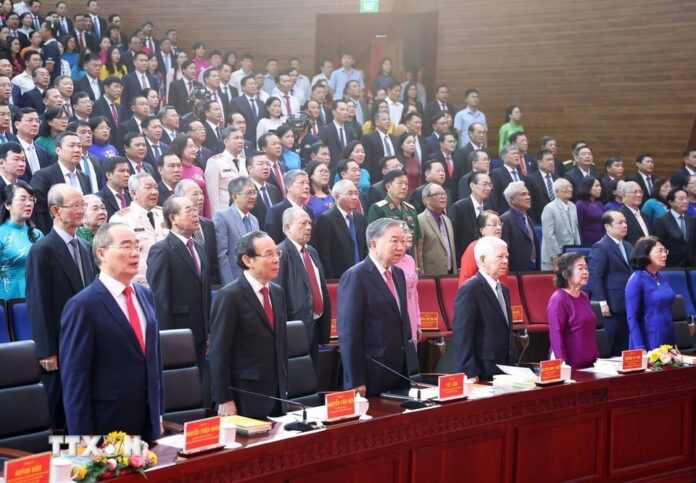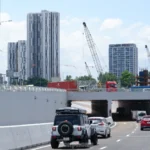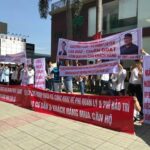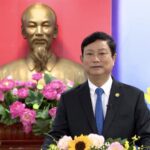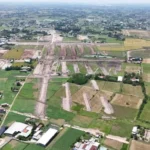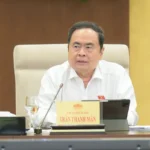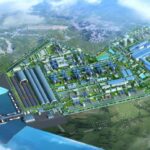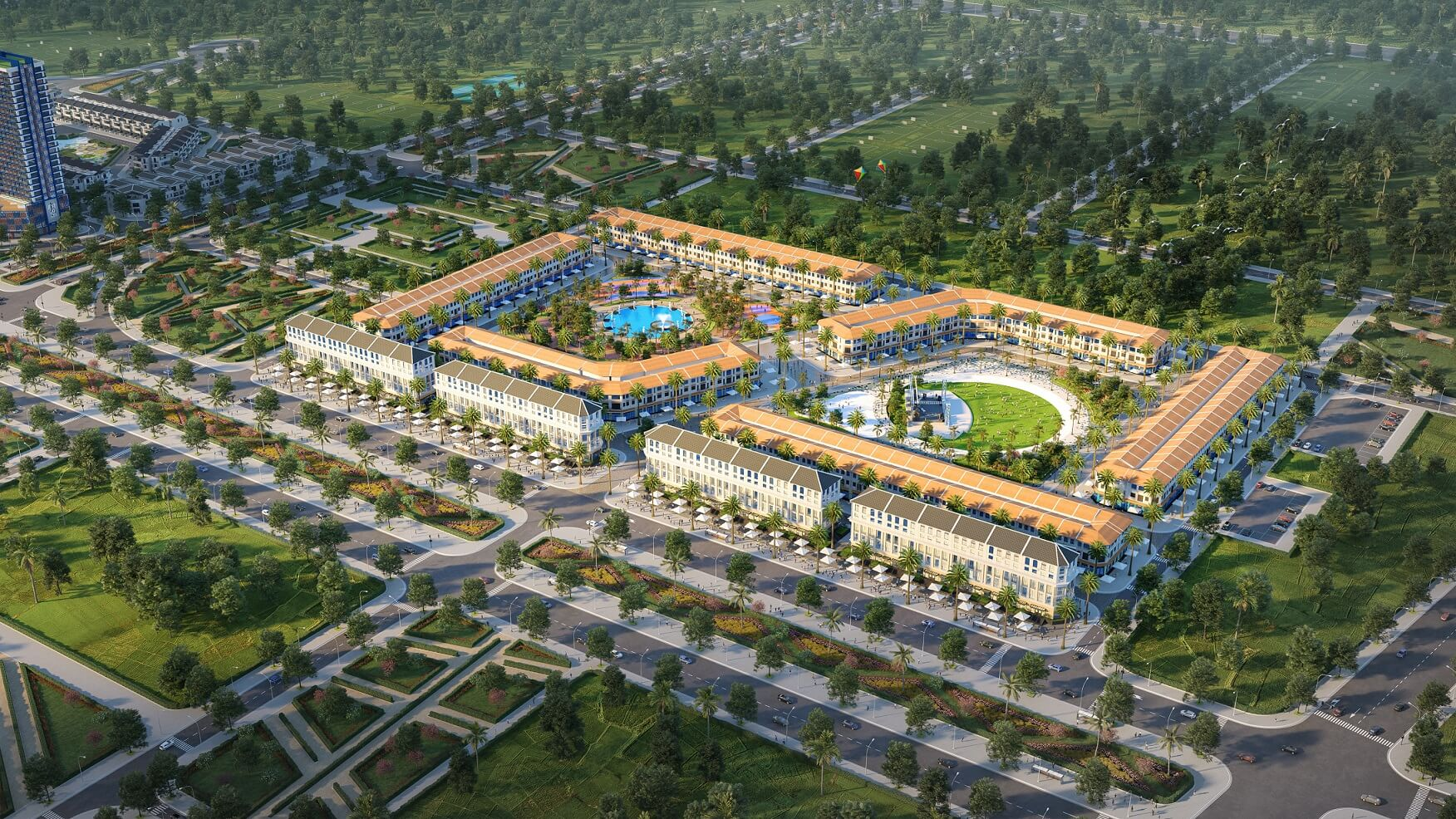General Secretary To Lam attends the ceremony at the Ho Chi Minh City conference bridge.
Also in attendance were comrades: Former Politburo member and former President Nguyen Minh Triet; Politburo member and Ho Chi Minh City Party Committee Secretary Nguyen Van Nen; former Politburo member and former Ho Chi Minh City Party Committee Secretary Nguyen Thien Nhan.
The ceremony was also attended by Central Party members, former Central Party members; leaders and former leaders of Ho Chi Minh City, Binh Duong province, Ba Ria – Vung Tau province; Party secretaries of directly subordinate cities and Party secretaries of communal-ward-district-level communes.
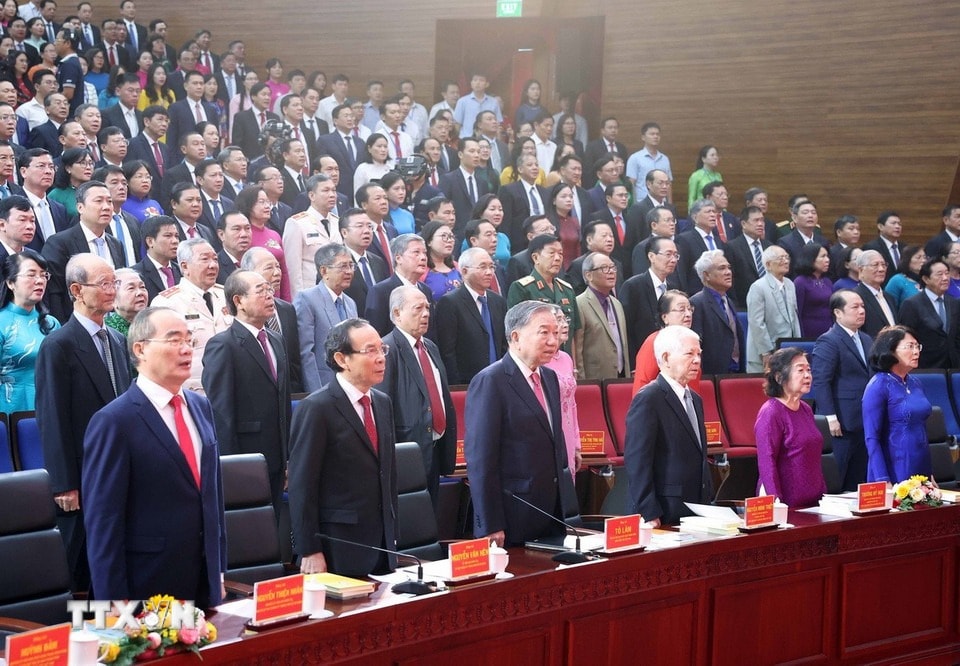
General Secretary To Lam and leaders and former leaders of the Party and State attend the ceremony. Photo: VNA
Earlier, the Central Committee agreed on the number of administrative units at the provincial level after the merger, which is 34 provinces and cities (28 provinces and 6 centrally-run cities); agreed to merge administrative units at the communal level to ensure a nationwide reduction of about 60-70% in the number of communal-level administrative units compared to the present.
Implementing this policy, at the 9th session of the 15th National Assembly, the National Assembly passed a resolution amending and supplementing a number of articles of the 2013 Constitution and a resolution on the rearrangement of administrative units at the provincial level. Accordingly, from July 1, 2025, there will be 34 provinces and cities nationwide and the implementation of a two-level local government model, including the provincial and communal levels.
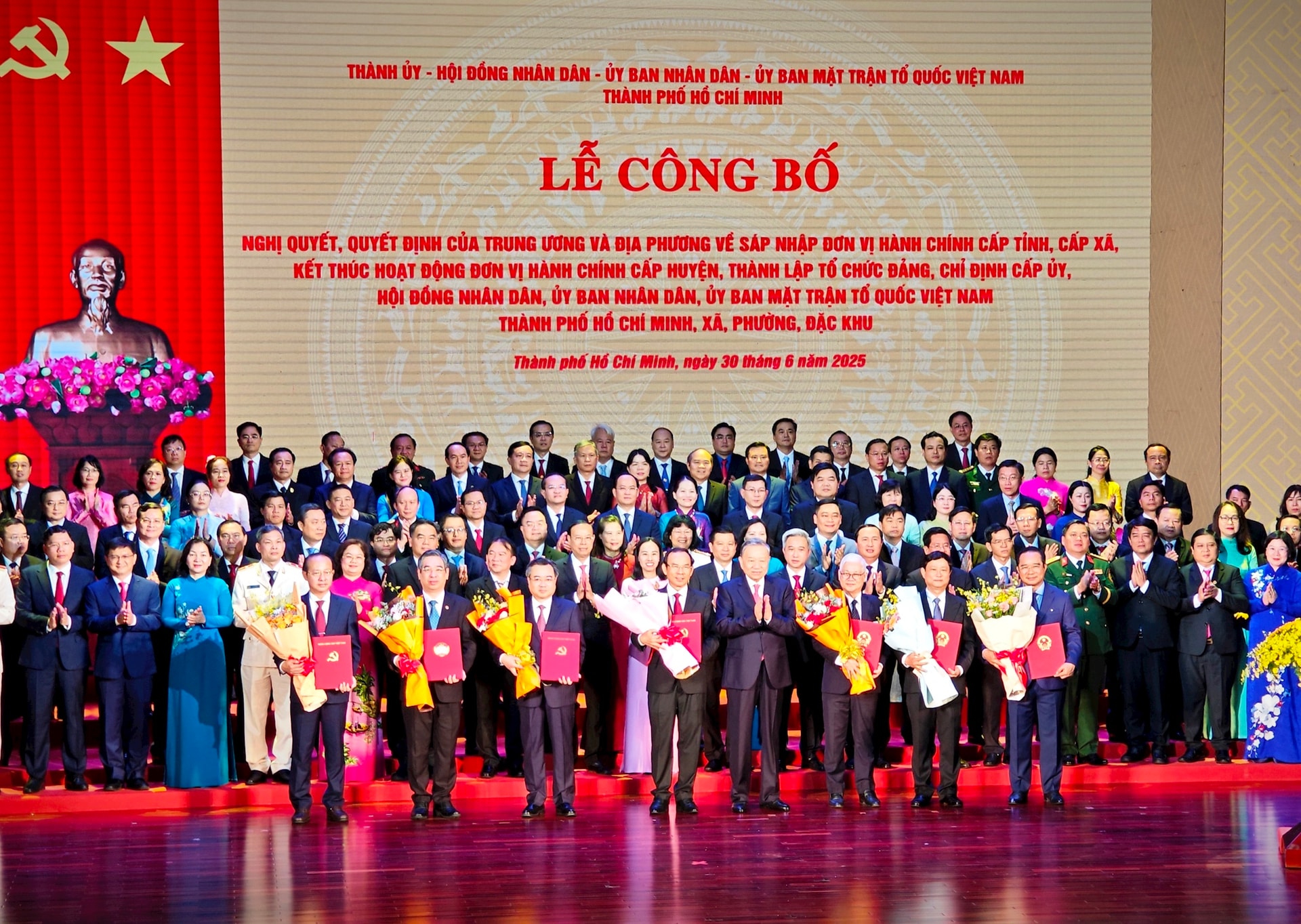
General Secretary To Lam presents personnel decisions of Ho Chi Minh City. Photo: Nguyen Le
At the ceremony, comrade Nguyen Quang Duong, member of the Party Central Committee, Deputy Head of the Central Organization Commission, announced the resolutions and decisions of the Central Committee on the merger of administrative units, the establishment of party organizations, and the appointment of key officials of the Party Committee, People’s Council, People’s Committee, and Fatherland Front Committee of Ho Chi Minh City.
Regarding the National Assembly’s resolution on the establishment of Ho Chi Minh City, the new Ho Chi Minh City is formed on the basis of consolidating the entire natural area and population scale of Ho Chi Minh City, Ba Ria – Vung Tau, and Binh Duong.
After the rearrangement, Ho Chi Minh City has 168 administrative units at the communal level, including 113 wards, 54 communes, and 1 district. Among these, there are 112 wards, 50 communes, and 1 district formed after the rearrangement, and 5 administrative units at the communal level that were not rearranged, namely Thoi Hoa ward and Long Son, Hoa Hiep, Binh Chau, and Thanh An communes. The city has a natural area of over 6,722 km2 and a population of over 14 million people.
The Politburo’s decision on the establishment of the Ho Chi Minh City Party Committee and the appointment of the Standing Committee, Secretary, and Deputy Secretaries of the Ho Chi Minh City Party Committee for the 2020-2025 term was also announced. Accordingly, the Ho Chi Minh City Party Committee has 107 official members. The Standing Committee of the Ho Chi Minh City Party Committee has 27 members.
After the establishment of the new Ho Chi Minh City, the Politburo appointed comrade Nguyen Van Nen, member of the Politburo, Secretary of the Ho Chi Minh City Party Committee (former), to the position of Secretary of the Ho Chi Minh City Party Committee (new) for the 2020-2025 term. Along with this, there are four Deputy Secretaries of the Ho Chi Minh City Party Committee (new) for the 2020-2025 term, namely: Nguyen Thanh Nghi, member of the Party Central Committee, Standing Deputy Secretary of the Ho Chi Minh City Party Committee; Nguyen Van Duoc, member of the Party Central Committee, Deputy Secretary of the Party Committee and Chairman of the People’s Committee of Ho Chi Minh City; Vo Van Minh (former Deputy Secretary of the Provincial Party Committee and Chairman of the People’s Committee of Binh Duong province); and Nguyen Phuoc Loc, Deputy Secretary of the Party Committee and Chairman of the Vietnam Fatherland Front Committee of Ho Chi Minh City.
The decision of the Party Central Committee’s Secretariat on the appointment of the Inspection Commission, the Chief Inspector, and the Deputy Chief Inspectors of the Ho Chi Minh City Party Committee Inspection Commission was announced, with a total of 19 members. Comrade Vo Van Dung, Head of the Ba Ria – Vung Tau Provincial Party Committee Inspection Commission, was appointed as the Chief Inspector of the Ho Chi Minh City Party Committee.
The resolution of the National Assembly Standing Committee on the appointment of the Head and Deputy Head of the National Assembly Delegation of Ho Chi Minh City and the Chairmen and Vice Chairmen of the Ho Chi Minh City People’s Council and Heads of the People’s Council’s Boards for the 2021-2026 term was announced, with a total of 12 members. Comrade Nguyen Van Loi, Secretary of the Binh Duong Provincial Party Committee and Head of the National Assembly Delegation of Binh Duong province, was appointed as the Head of the National Assembly Delegation of Ho Chi Minh City.
The decision on the appointment of the Chairman and Vice Chairmen of the Ho Chi Minh City People’s Council was also announced. Accordingly, comrade Vo Van Minh, Chairman of the Binh Duong Provincial People’s Committee, was appointed as the Chairman of the Ho Chi Minh City People’s Council.
The Prime Minister’s decision on the appointment of the Chairman and Vice Chairmen of the Ho Chi Minh City People’s Committee for the 2021-2026 term was announced. Accordingly, comrade Nguyen Van Duoc, Chairman of the Ho Chi Minh City People’s Committee, was appointed as the Chairman of the Ho Chi Minh City People’s Committee (new).
The decision of the Central Committee of the Vietnam Fatherland Front on the establishment of the Vietnam Fatherland Front Committee of Ho Chi Minh City was announced. Accordingly, comrade Nguyen Phuoc Loc, Deputy Secretary of the Ho Chi Minh City Party Committee and Chairman of the Vietnam Fatherland Front Committee of Ho Chi Minh City, was appointed as Deputy Secretary of the Ho Chi Minh City Party Committee and Chairman of the Vietnam Fatherland Front Committee of Ho Chi Minh City (new).
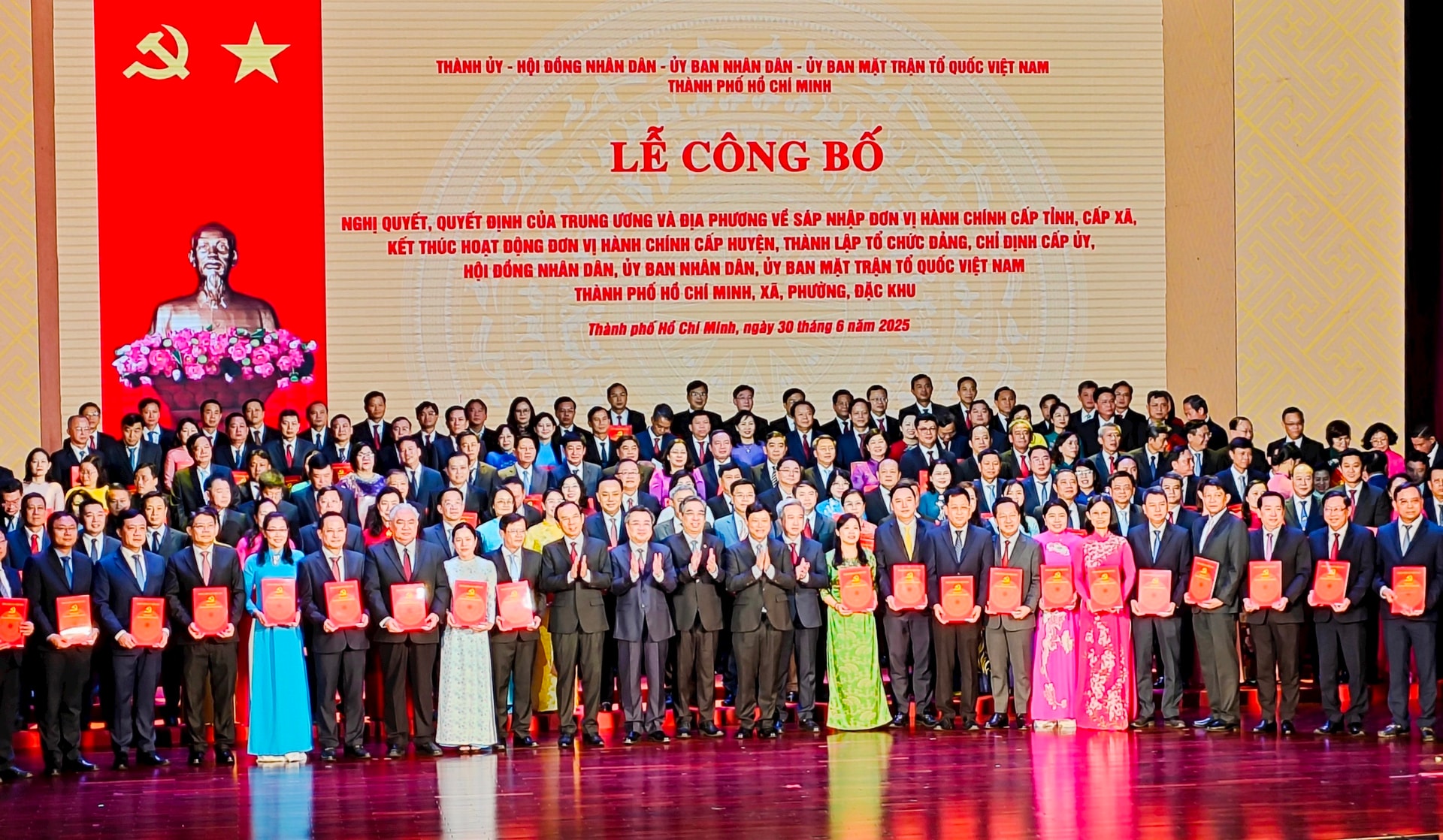
The Ho Chi Minh City Party Committee presents decisions appointing secretaries of 168 wards, communes, and districts. Photo: Nguyen Le
At the ceremony, comrade Nguyen Thanh Nghi, member of the Party Central Committee, Standing Deputy Secretary of the Ho Chi Minh City Party Committee, announced the resolutions and decisions of the province and city on the merger of communes, wards, and districts in Ho Chi Minh City, comprising a total of 168 communes, wards, and districts.
The rearrangement of the country’s administrative units is a historic step with strategic significance
In his speech at the ceremony, General Secretary To Lam emphasized that in the joyful and proud atmosphere, full of aspirations to continue the renewal and development process, at the gloriously named Ho Chi Minh City, the country’s largest economic, industrial, and port center, we are gathered here to witness a historic event.
This is not just an administrative event, but a strategic transformation and an objective requirement of the people and the country in building dynamic regions for national and regional development, in order to live up to the aspiration of a “powerful Vietnam by 2045.”
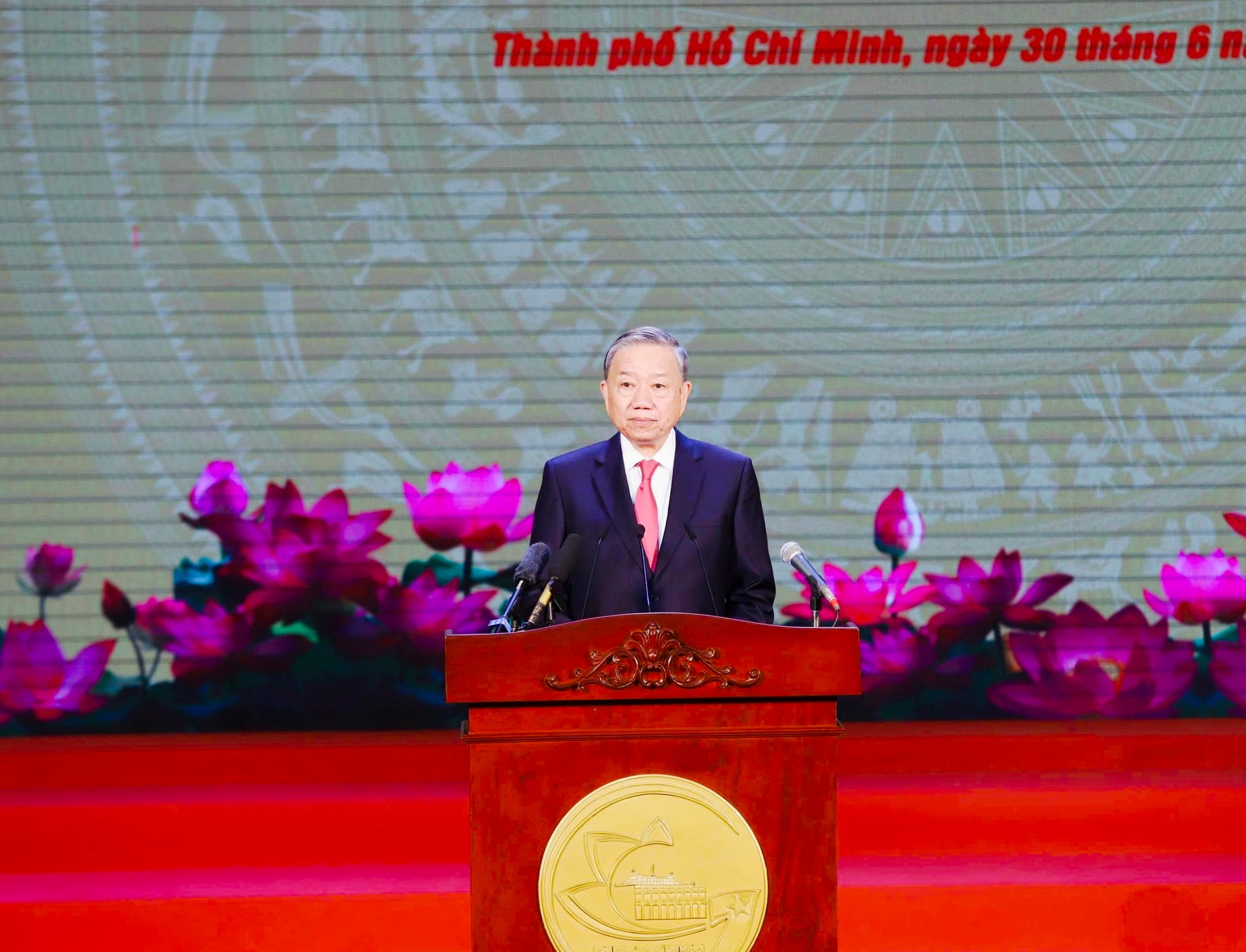
General Secretary To Lam delivers a speech at the ceremony. Photo: Nguyen Le
Throughout many historical periods, Ho Chi Minh City, Binh Duong, and Ba Ria – Vung Tau have affirmed themselves as three strong development poles of the South, where outstanding achievements in industry, commerce, services, seaports, and international integration are gathered.
The integration of the three localities’ spaces is not a simple addition but a crystallization of wisdom and the will to develop together, to form a super city – a regional and global-scale financial, production, logistics, and innovation hub.
This new development space is built on a long-term vision, aiming for harmonious, sustainable, and scientific development. It is the most vivid manifestation of strategic thinking and the reform of the organizational model of the government to better serve the people, be closer to the people, and be more effective.
This is also a pioneering and breakthrough step in reforming the urban government apparatus, creating favorable conditions for the rapid, strong, and effective development of the country’s most urbanized region.
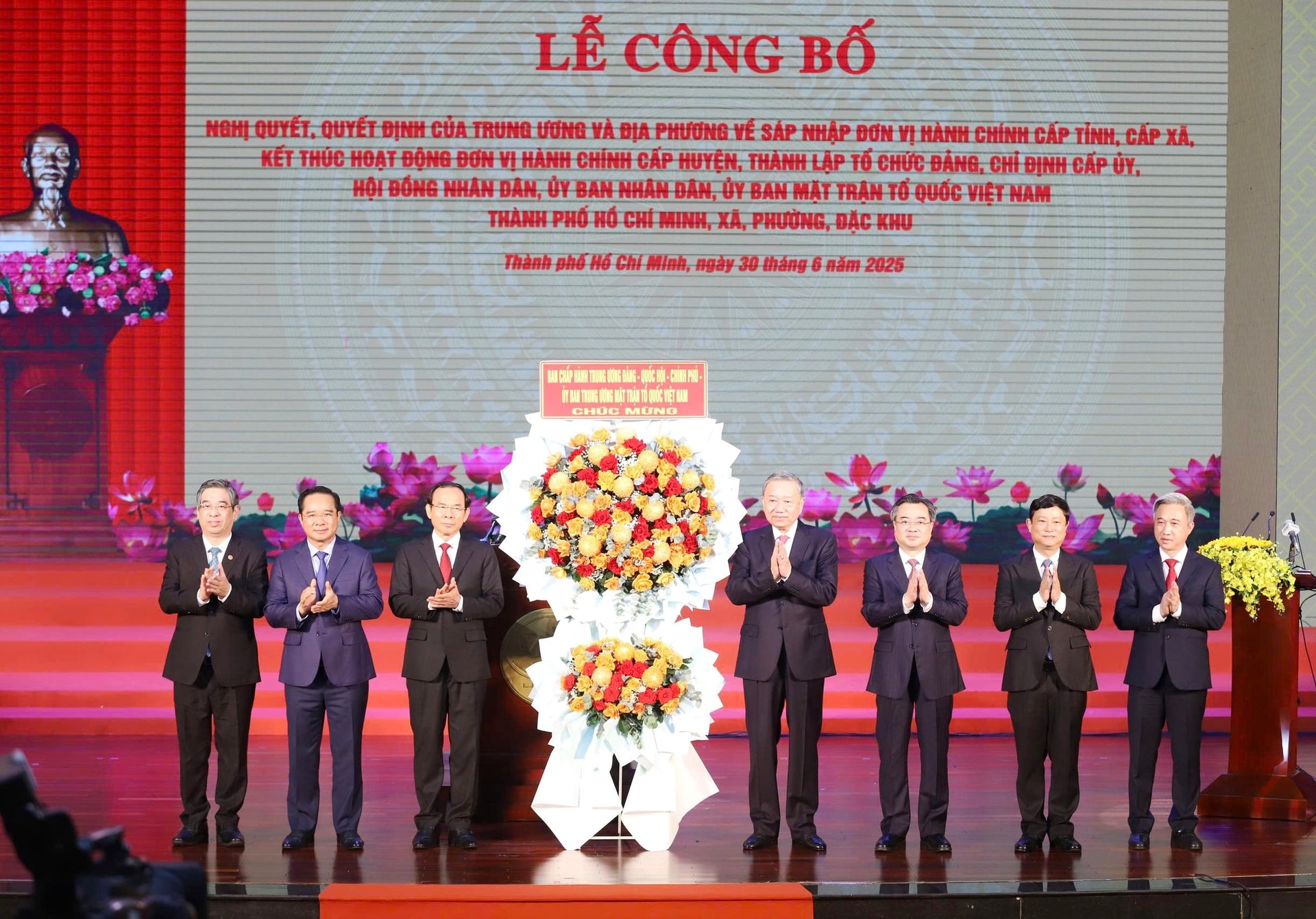
General Secretary To Lam presents flowers to congratulate the Ho Chi Minh City Party Committee after its establishment. Photo: Nguyen Le
This model will enhance autonomy and flexibility in governance while creating a clear institutional framework for satellite cities, industrial parks, logistics centers, and seaport service areas to fully tap into their potential. Most importantly, a people-serving government will no longer be just a slogan but will become a concrete and substantive action, reaching every citizen and business.
“At this solemn and momentous hour, on behalf of the Party and State leaders, I respectfully call upon all cadres, party members, civil servants, employees, armed forces, business community, and people of Ho Chi Minh City to unite with one heart, take resolute, creative, and disciplined actions to bring this merged city to new heights. This is a challenge, but also a historic opportunity. The success of the new City cannot come solely from documents or resolutions but must come from popular consensus, determined leadership, and dedicated implementation,” General Secretary To Lam said.
General Secretary To Lam emphasized that the decision to rearrange the country’s administrative units is a historic step with strategic significance, marking a new stage in the development of perfecting the State administrative apparatus, perfecting the system and organization of the political system in a synchronous, streamlined, effective, and efficient manner, toward a modern administrative governance system that is close to and serves the people, so that all benefits belong to the people.
The reorganization of administrative boundaries and the operation of a new local government model are objective and inevitable requirements for the country’s development in the context of globalization, digital transformation, and the Fourth Industrial Revolution. This is a valuable opportunity for us to renew our leadership thinking, reform state management methods, strongly apply science and technology, improve national governance quality, and enhance the effectiveness of serving the people. This is the result of the 95-year revolutionary cause under the leadership of the Party, 80 years of the Democratic Republic of Vietnam and the Socialist Republic of Vietnam, along with 40 years of renewal.
“Let every working day be a day of creation. Let every person be a warrior on the front line of innovation. Let the revolutionary spirit of attack permeate every action, every policy, and every step forward. From today, let us continue to unite, be unanimous, and work together to successfully implement the two-level local government model, ensure the smooth and effective operation of the organizational system, protect the legitimate rights and interests of the people, take care of social security, and expand development opportunities for all strata of the people.
I believe that with the great national unity, with the aspiration for a powerful Vietnam, and with the unceasing innovation will, the Vietnamese people will firmly step forward on the path of building a peaceful, prosperous, and happy Socialist Vietnam. At this point, our team is well-prepared, our ranks are neat, and the whole nation is marching towards a glorious future for the country and for the happiness of the people, for a sustainably developing Vietnam,” General Secretary To Lam emphasized.
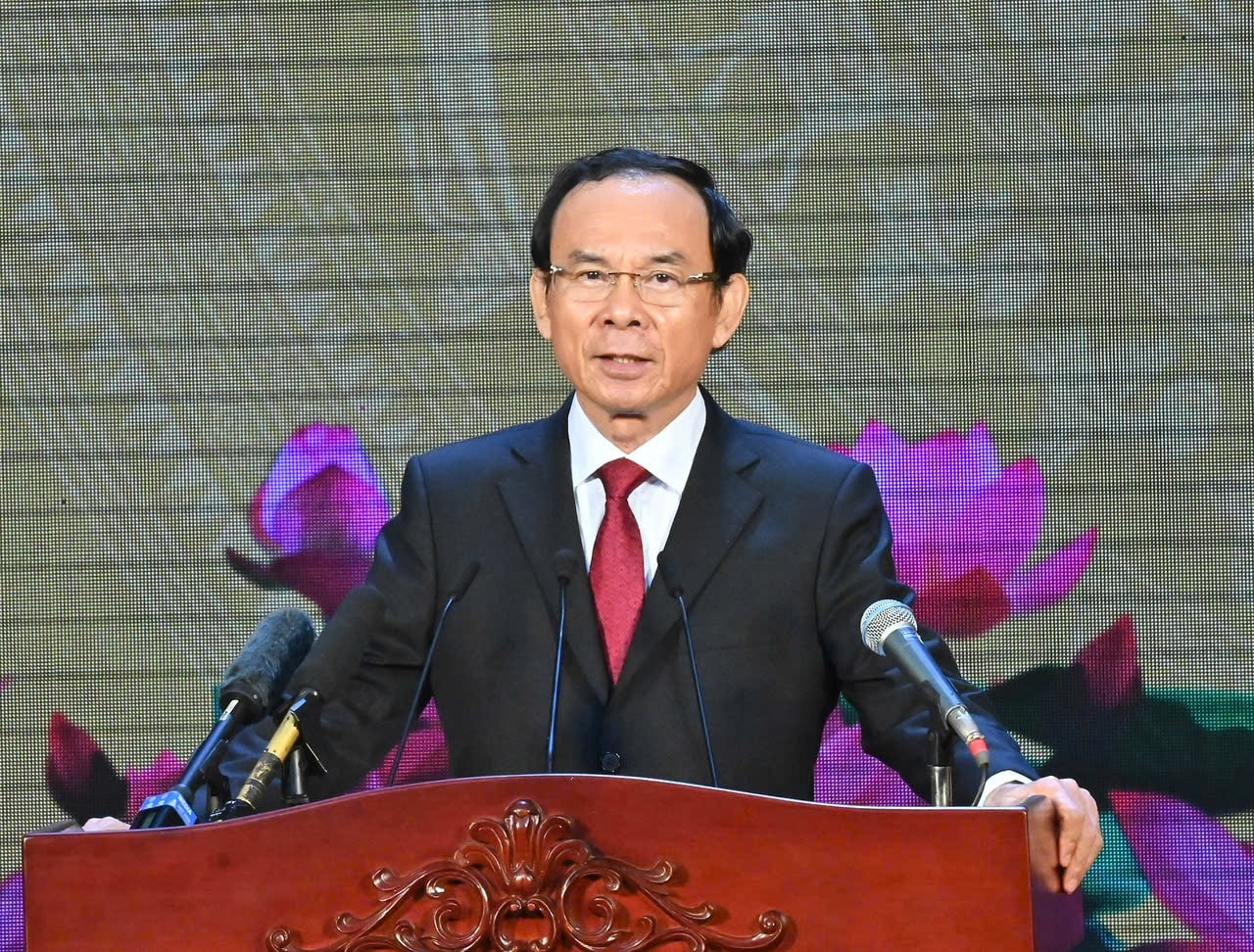
Ho Chi Minh City Party Committee Secretary Nguyen Van Nen speaks at the announcement ceremony. Photo: Nguyen Le
Speaking at the ceremony, Ho Chi Minh City Party Committee Secretary Nguyen Van Nen said that from tomorrow (July 1), Ho Chi Minh City will become a new administrative-economic entity with a new position on the map of large cities in the region and the world, carrying great aspirations and historical opportunities to optimize its outstanding development potential and soon become a multi-center, multi-industry, and multifunctional supercity with global competitiveness and realize the goal of building a civilized, modern, and gracious city.
“On behalf of the Party committees, authorities, and people of Ho Chi Minh City, Binh Duong, and Ba Ria – Vung Tau, and on behalf of the individuals who have just been assigned new responsibilities, I would like to express my sincere gratitude to the Central Committee for its decisive, consistent, and unified leadership; its resolute, synchronous, and swift direction; and its strong, clear, and effective administration. The decision to assign the mission, role, and responsibility to Ho Chi Minh City, Binh Duong, and Ba Ria – Vung Tau to form the new Ho Chi Minh City is not only about sentiment for the past but also about responsibility for the future; it is not only a trend but also an inevitable movement of the law of development,” comrade Nguyen Van Nen said.
The Big Unveiling: Unveiling the Longest Underground Tunnel in Ho Chi Minh City
On June 30, the HC1-01 tunnel, part of the An Phu Intersection project in Ho Chi Minh City, was officially opened to traffic. This significant milestone marks a pivotal step in the effort to alleviate chronic congestion in the city’s eastern district.
The Battle for Home: Unraveling the Dispute Plaguing Ho Chi Minh City’s Apartment Complexes
There are two primary reasons why disputes and complaints arise in Ho Chi Minh City’s condominium communities. The first stems from developers violating criminal laws, leading to prosecutions, investigations, or issues related to the management, operation, and utilization of the condominium properties. This includes delays in providing ownership certificates to residents and failure to hand over maintenance funds.
Transforming Land Usage: A Hefty 300% Surge in Fees
The new land pricing policy has resulted in a significant increase in taxes for those wishing to change their land usage. With a 250-300% surge in taxes for converting agricultural land to residential use, many individuals are now facing financial challenges due to the substantial increase in land use charges. This new calculation method, which involves deducting the cost of agricultural land from the residential land price, has left many struggling to keep up with the rising costs.

